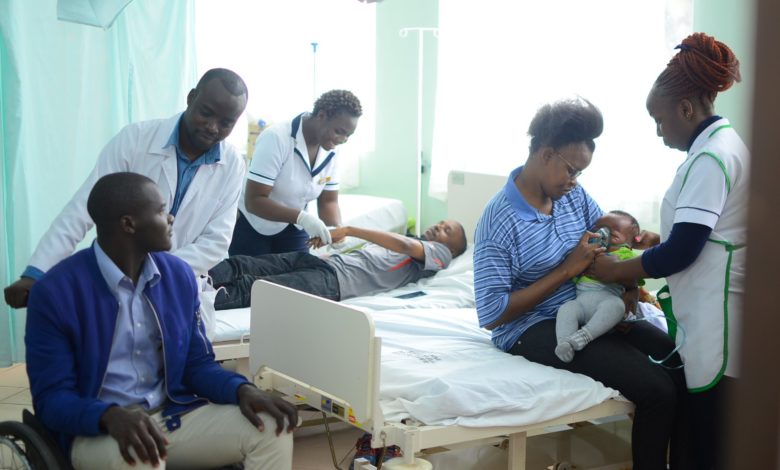Maternal Health Threatened By COVID-19
From conception, the possibilities of bringing a new life brings joy to a mother to be. Coronavirus has however changed how things are done and made it more expensive.

Pregnant mothers are expected to follow various procedures and programs to ensure a safe and smooth journey all the way to delivery.
However, since the advent of COVID-19, the journey through a safe and successful pregnancy to delivery has become expensive and full of challenges.
These challenges range from possibilities of contracting the new disease through contact with an infected person, to managing the new normal of social distancing. They also have to sanitize and wear masks like other people among other measures.
A Morbidity and Mortality Weekly Report (MMWR) by the Centre for Disease Control (CDC) suggests that pregnant women with COVID-19 are more likely to be hospitalized.They also have an increased risk of being admitted in intensive care unit (ICU) and be placed on ventilation than non-pregnant women.
Insurance companies keep off
The disease has also negatively impact on the insurance medical coverage,insurance companies are reluctant to pay for treatment in private hospitals due to the high cost when COVID-19 is involved.
A few of them who have agreed to cover the same, like Resolution Health, have restricted the cover to a few selected public hospitals.
“Typical insurance standards do not cover pandemics and epidemics, according to Insurance Regulatory Authority. But a meeting between health insurance companies and the agency resulted in an agreement to cover the disease”, said Mr Godfrey Kiptum, the Commissioner of Insurance.
The number of pregnant women visiting medical facilities has drastically dropped,which worries the health providers. Thomas Ndolo, the chief administrator at Shalom Hospital, Athi River said that “most pregnant women have shunned hospitals due to the fear of contracting COVID-19 “.
Scarcity of blood
He added that some women prefer to deliver at home under care givers, most of whom are not trained medical personnel.
Mr. Ndolo also told RoGGKenya that scarcity of blood has affected pregnant women in a significant way. ‘’Some pregnant women require blood because of the possibilities of losing blood during delivery. At least two pints is always required. The blood donation has however been affected by COVID- 19 because donors are keeping off due to fear of contracting it’’.
Dr.Jemmima Kariuki, an obstetrician and gynecologist at Kenyatta National Hospital (KNH), confirmed that the scarcity of blood is wide spread across the country.
She added that home delivery has contributed to an increase in complications and deaths. ‘”We started receiving mothers mostly in the morning with babies who had died at home or mothers with ruptured uterus or more serious tears.”
Ms.Grace Muriuki, a laboratory technologist at Nairobi Radiotherapy and Cancer Center said that blood has been scarce and vulnerable patients with cancer and pregnant women can hardly get it. They therefore ask patients to mobilize their friends and relatives to donate.
RoGGKenya also visited Mbagathi hospital to find out how COVID-19 has affected pregnant mothers. Mr. Anthony Memusi, a laboratory manager at the hospital said that there has been an expanded pre-screening tool for pregnant women.”It goes beyond fever, possibilities of having traveled out of the country or coming into contact with anyone who recently traveled. It is easier for us because we’re one of the referral centers.”
High cost of delivery
Mr. Ndolo of Shalom Hospital also agreed with Memusi about the pre-screening tool.He recounted how they had a pregnant patient who tested positive for COVID-19. Her baby was born negative and the two had to be separated immediately after birth.
Facilities that don’t have the capacity to handle COVID-19 patients have to refer them to other hospitals. However, this increases the cost of delivery. For a country where the child and maternal mortality rates are high, this is highly problematic.
This is worsened when the patient has to be treated in the Unit (ICU), the hospitals with ICU facilities also demand for COVID-19 test results before accepting the patient. The cost shoots up when a patient is COVID-19 positive because the care givers have to use extra protective equipment.
High maternal and child mortality
Currently, Kenya has a Maternal Mortality Ratio (MMR) of 362 maternal deaths per 100,000 live births and a still birth rate of 23 deaths per 1000 live births. This is far below the target of 147 maternal deaths per 100,000 live births and 12 stillbirths per 1000 live births respectively.
Belinda Achieng, a proud mother of four recounts vividly every single journey she’s been through. Most importantly, the last one she had when she was pregnant with her daughter Giana.
She says that the medical cover she had from her former employer Capital Club was very useful.
The majority of Kenyan women are not privileged to have an employer who provides them with medical covers to cater for maternity.
Many pregnant mothers, mostly from informal settlements in Nairobi deliver in Pumwani Hospital, Kenyatta National Hospital, Mbagathi Hospital and Mama Lucy Referral Hospital.
What journalist should do:
- Follow up with the Ministry of Health (MoH) to know the training they give to midwives and care givers who operate away from the formal structured medical facilities.
- Find out if the government is supporting private hospitals and health facilities that are hard hit by the pandemic.
- Talk to women who have delivered during this period of the COVID-19 pandemic and share their experiences with your audience.
- Find out how health facilities are coping with COVID-19. What changes have they made to serve their customers better?
- Look out for data produced by different surveys about maternal and child morality. Compare the numbers before and during COVID-19.
By Vitalis Rugie